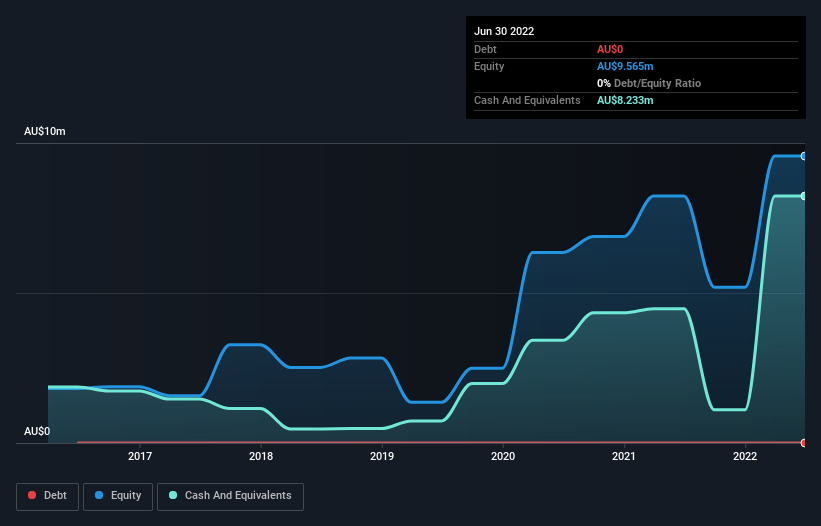- Australia
- /
- Metals and Mining
- /
- ASX:REE
Is RareX (ASX:REE) In A Good Position To Deliver On Growth Plans?
Just because a business does not make any money, does not mean that the stock will go down. For example, biotech and mining exploration companies often lose money for years before finding success with a new treatment or mineral discovery. But while history lauds those rare successes, those that fail are often forgotten; who remembers Pets.com?
Given this risk, we thought we'd take a look at whether RareX (ASX:REE) shareholders should be worried about its cash burn. In this report, we will consider the company's annual negative free cash flow, henceforth referring to it as the 'cash burn'. We'll start by comparing its cash burn with its cash reserves in order to calculate its cash runway.
View our latest analysis for RareX
Does RareX Have A Long Cash Runway?
A company's cash runway is calculated by dividing its cash hoard by its cash burn. As at June 2022, RareX had cash of AU$8.2m and no debt. In the last year, its cash burn was AU$6.5m. Therefore, from June 2022 it had roughly 15 months of cash runway. While that cash runway isn't too concerning, sensible holders would be peering into the distance, and considering what happens if the company runs out of cash. You can see how its cash balance has changed over time in the image below.

How Is RareX's Cash Burn Changing Over Time?
Because RareX isn't currently generating revenue, we consider it an early-stage business. Nonetheless, we can still examine its cash burn trajectory as part of our assessment of its cash burn situation. With the cash burn rate up 9.9% in the last year, it seems that the company is ratcheting up investment in the business over time. However, the company's true cash runway will therefore be shorter than suggested above, if spending continues to increase. Admittedly, we're a bit cautious of RareX due to its lack of significant operating revenues. We prefer most of the stocks on this list of stocks that analysts expect to grow.
Can RareX Raise More Cash Easily?
Since its cash burn is increasing (albeit only slightly), RareX shareholders should still be mindful of the possibility it will require more cash in the future. Issuing new shares, or taking on debt, are the most common ways for a listed company to raise more money for its business. Commonly, a business will sell new shares in itself to raise cash and drive growth. We can compare a company's cash burn to its market capitalisation to get a sense for how many new shares a company would have to issue to fund one year's operations.
Since it has a market capitalisation of AU$34m, RareX's AU$6.5m in cash burn equates to about 19% of its market value. Given that situation, it's fair to say the company wouldn't have much trouble raising more cash for growth, but shareholders would be somewhat diluted.
Is RareX's Cash Burn A Worry?
On this analysis of RareX's cash burn, we think its cash runway was reassuring, while its increasing cash burn has us a bit worried. Even though we don't think it has a problem with its cash burn, the analysis we've done in this article does suggest that shareholders should give some careful thought to the potential cost of raising more money in the future. Separately, we looked at different risks affecting the company and spotted 4 warning signs for RareX (of which 2 make us uncomfortable!) you should know about.
Of course RareX may not be the best stock to buy. So you may wish to see this free collection of companies boasting high return on equity, or this list of stocks that insiders are buying.
New: AI Stock Screener & Alerts
Our new AI Stock Screener scans the market every day to uncover opportunities.
• Dividend Powerhouses (3%+ Yield)
• Undervalued Small Caps with Insider Buying
• High growth Tech and AI Companies
Or build your own from over 50 metrics.
Have feedback on this article? Concerned about the content? Get in touch with us directly. Alternatively, email editorial-team (at) simplywallst.com.
This article by Simply Wall St is general in nature. We provide commentary based on historical data and analyst forecasts only using an unbiased methodology and our articles are not intended to be financial advice. It does not constitute a recommendation to buy or sell any stock, and does not take account of your objectives, or your financial situation. We aim to bring you long-term focused analysis driven by fundamental data. Note that our analysis may not factor in the latest price-sensitive company announcements or qualitative material. Simply Wall St has no position in any stocks mentioned.
About ASX:REE
RareX
Engages in the exploration and development of mineral properties in Australia.
Flawless balance sheet with slight risk.
Similar Companies
Market Insights
Community Narratives



